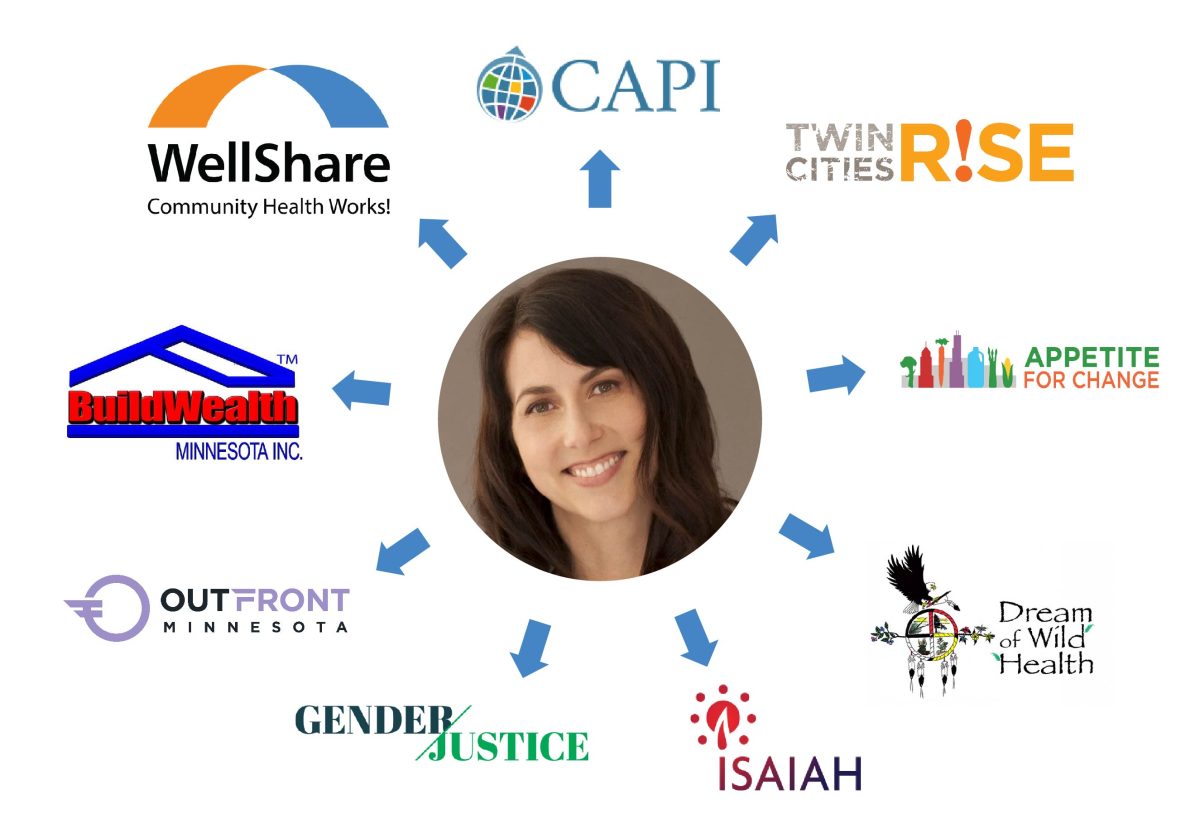Philanthropist Mackenzie Scott’s Yield Giving Organization awarded nine Twin Cities community-based nonprofits $2 million each on March 19.
Scott’s organization selected around 350 community-based organizations around the United States with around $640 million allocated, each receiving $2 million. The following nine Minnesota-based nonprofits were selected: OutFront Minnesota, ISAIAH, WellShare International, Appetite for Change, Gender Justice, Build Wealth Minnesota, Twin Cities R!se, Dream of Wild Health and CAPI USA.
WellShare International spokesperson Andrea Ross said they mobilize community health workers to reduce health inequalities in underrepresented communities around the Twin Cities area and internationally. Ross said WellShare plans to use the funds to strengthen their administration systems, data tracking and staff development and expand their locations.
“It’s not often that I am lost for words, but I just needed a moment to kind of take it in and catch my breath and really understand the depth and the magnitude and the generosity and how an organization and life-changing that award is,” Ross said.
Ross said WellShare’s health workers are trained to provide services throughout all stages of life and they will invest in their staff and community in hopes of improving support for community health care.
“Every day you’ll see them at the gathering centers, you may see them at a community mall or a community gathering space,” Ross said. “They’re bringing that education to where people are and where they live their daily lives.”
One organization, ISAIAH, is a coalition of multi-racial and multi-faith communities fighting for racial and economic justice in Minnesota, according to spokesperson Trevor Cochlin. Cochlin said ISAIAH connects with local Christian institutions, mosques, childcare centers and Black-owned barber shops to achieve change within these institutions.
“We have folks that we call leaders that leverage ISAIAH as a vehicle for building power to create change,” Cochlin said. “The way that we make sure that our elected officials are leading with the values that people in Minnesota care about is by building people power.”
CAPI USA helps immigrants and refugees resettle in Minnesota with financial coaching, housing and food. CAPI spokesperson Monique Hernandez said they helped around 200 immigrants from Afghanistan resettle in the Twin Cities in 2022 after the Taliban took over.
“We try to be like a one-stop shop for people,” Hernandez said. “We do benefits enrollment and food assistance. We have our financial team and our employment program. So it’s kind of everything there.”
Cochlin said ISAIAH was thrilled to receive $2 million from Scott’s organization. Cochlin added that the funds would be used to fuel their organizing work around the Twin Cities, such as advocating for legislation on housing, childcare and more.
“Organizing is at the heart of ISAIAH, our theory of change and through Mackenzie’s passion or honesty that’s going to allow us over the next four years to continue to do that,” Cochlin said.
Hernandez said the $2 million would go to CAPI’s community reinvestment fund to help pay the closing costs of housing for more than 20 families and go to their marching savings program. Hernandez said she and Executive Director Mary Niedermeyer were at a United Way event when they saw the email granting them the funds.
“She showed me the email and both of us just sat there like, ‘Don’t emote,’” Hernandez said. “Just kind of like that internal screaming that’s happening and just like smile and like, oh, because everything is embargoed until they make the announcement. So we can’t put anything about that.”
Hernandez added that CAPI plans to use some funds to expand its food shelf location in Brooklyn Center, add a community center and possibly a community garden.
Cochlin said in the past ISAIAH has done tabling events and tours at local universities to learn about students’ concerns and frustrations about their communities and what change they want. Cochlin added students can become involved with ISAIAH through their youth coalition, which advocates for democracy and involvement in the state legislature.
“Students themselves organized to contact their state representatives to advocate for the democracy of the people because they wanted voting to be easier as college students who might not have been residents where they went to college,” Cochlin said.
Hernandez said CAPI offers a youth fellowship for women of color aged 16 to 24 who want to advocate for legislative goals. CAPI also has community engagement events, like their 5K in June at Centennial Park, according to Hernandez.
Ross said she started at WellShare because of her experiences in the healthcare and nursing industry, filling the gap between her and the community she served.
“I just think about the continued investment in community health work really caused the ability to change the face and the landscape of service delivery,” Ross said. “I just couldn’t get more excited about something that, to be honest, in the health care world, wasn’t talked about as much.”
Cochlin said through Scott’s funding, ISAIAH can better foster relationships within the community. Cochlin added these relationships are at the heart of ISAIAH’s work.
“What connects us to the world around us is relationships. And I think that’s kind of like at the heart of organizing work,” Cochlin said. “It’s like how much we’re in conversation with our neighbors, our family members, for me, groups like Faith Institution, and that stuff just takes time. It takes time to develop relationships.”









Ken DeYoe
Apr 2, 2024 at 8:06 am
I don’t understand why she gets so much press for this. This should be the norm for the ultra wealthy. Only 9 non-profits! Should have been more like 90. And, more importantly, no animal rescues received any funding!